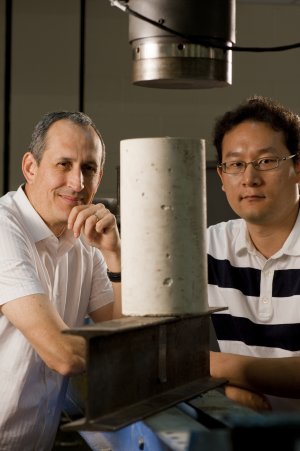Jul 28 2010
Bricks, blocks, and steel I-beams - step aside. A new genre of construction materials, made from stuff barely 1/50,000th the width of a human hair, is about to debut in the building of homes, offices, bridges, and other structures.
And a new report is highlighting both the potential benefits of these nanomaterials in improving construction materials and the need for guidelines to regulate their use and disposal. The report appears in the monthly journal ACS Nano: “Nanomaterials in the Construction Industry: A Review of Their Applications and Environmental Health and Safety Considerations.”
 Scientists Pedro Alvarez (left) and Jaesang Lee stand behind a concrete cylinder and an I beam, which is among the construction materials that manufacturers could potentially improve using certain nanomaterials. Credit: Jeff Fitlow, Rice University
Scientists Pedro Alvarez (left) and Jaesang Lee stand behind a concrete cylinder and an I beam, which is among the construction materials that manufacturers could potentially improve using certain nanomaterials. Credit: Jeff Fitlow, Rice University
Pedro Alvarez and colleagues note that nanomaterials likely will have a greater impact on the construction industry than any other sector of the economy, except biomedical and electronics applications. Certain nanomaterials can improve the strength of concrete, serve as self-cleaning and self-sanitizing coatings, and provide many other construction benefits. Concerns exist, however, about the potential adverse health and environmental effects of construction nanomaterials.
The scientists analyzed more than 140 studies on the benefits and risks of nanomaterials. They found that the materials can provide a wide variety of benefits for the construction industry, ranging from greater strength and durability to improved energy efficiency. The report also identified potential adverse health and environmental effects, and cites the importance of developing guidelines to regulate the use and disposal of construction nanomaterials.